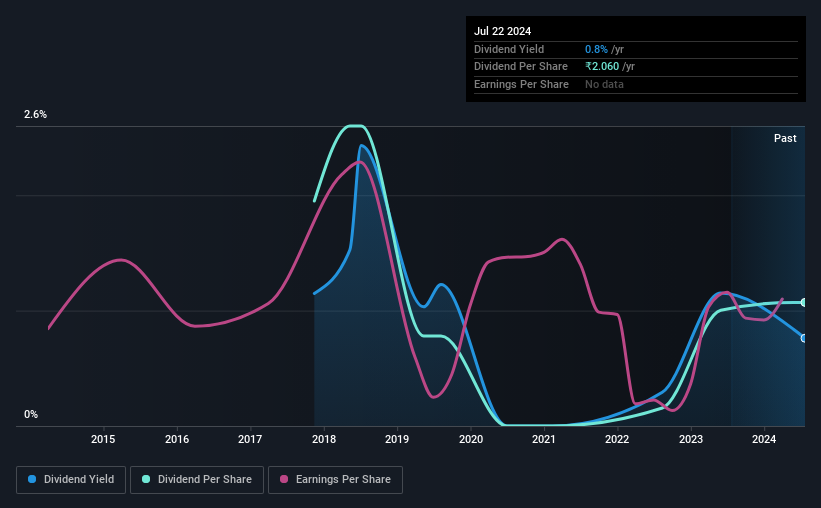New India Assurance (NSE:NIACL) Is Increasing Its Dividend To ₹2.06
The board of The New India Assurance Company Limited (NSE:NIACL) has announced that it will be paying its dividend of ₹2.06 on the 1st of January, an increased payment from last year's comparable dividend. This makes the dividend yield 0.8%, which is above the industry average.
View our latest analysis for New India Assurance
New India Assurance's Dividend Is Well Covered By Earnings
Impressive dividend yields are good, but this doesn't matter much if the payments can't be sustained. New India Assurance is quite easily earning enough to cover the dividend, however it is being let down by weak cash flows. In general, we consider cash flow to be more important than earnings, so we would be cautious about relying on the sustainability of this dividend.
Looking forward, earnings per share is forecast to rise by 22.1% over the next year. If the dividend continues along recent trends, we estimate the payout ratio will be 24%, which is in the range that makes us comfortable with the sustainability of the dividend.

New India Assurance's Dividend Has Lacked Consistency
Looking back, New India Assurance's dividend hasn't been particularly consistent. If the company cuts once, it definitely isn't argument against the possibility of it cutting in the future. The dividend has gone from an annual total of ₹3.75 in 2017 to the most recent total annual payment of ₹2.06. This works out to be a decline of approximately 8.2% per year over that time. Generally, we don't like to see a dividend that has been declining over time as this can degrade shareholders' returns and indicate that the company may be running into problems.
The Dividend Looks Likely To Grow
With a relatively unstable dividend, and a poor history of shrinking dividends, it's even more important to see if EPS is growing. New India Assurance has seen EPS rising for the last five years, at 13% per annum. With a decent amount of growth and a low payout ratio, we think this bodes well for New India Assurance's prospects of growing its dividend payments in the future.
Our Thoughts On New India Assurance's Dividend
In summary, while it's always good to see the dividend being raised, we don't think New India Assurance's payments are rock solid. While the low payout ratio is a redeeming feature, this is offset by the minimal cash to cover the payments. We don't think New India Assurance is a great stock to add to your portfolio if income is your focus.
Market movements attest to how highly valued a consistent dividend policy is compared to one which is more unpredictable. Meanwhile, despite the importance of dividend payments, they are not the only factors our readers should know when assessing a company. For example, we've identified 3 warning signs for New India Assurance (1 shouldn't be ignored!) that you should be aware of before investing. If you are a dividend investor, you might also want to look at our curated list of high yield dividend stocks.
Valuation is complex, but we're here to simplify it.
Discover if New India Assurance might be undervalued or overvalued with our detailed analysis, featuring fair value estimates, potential risks, dividends, insider trades, and its financial condition.
Access Free AnalysisHave feedback on this article? Concerned about the content? Get in touch with us directly. Alternatively, email editorial-team (at) simplywallst.com.
This article by Simply Wall St is general in nature. We provide commentary based on historical data and analyst forecasts only using an unbiased methodology and our articles are not intended to be financial advice. It does not constitute a recommendation to buy or sell any stock, and does not take account of your objectives, or your financial situation. We aim to bring you long-term focused analysis driven by fundamental data. Note that our analysis may not factor in the latest price-sensitive company announcements or qualitative material. Simply Wall St has no position in any stocks mentioned.
Have feedback on this article? Concerned about the content? Get in touch with us directly. Alternatively, email editorial-team@simplywallst.com
About NSEI:NIACL
New India Assurance
Operates as a general insurance company in India and internationally.
Excellent balance sheet with moderate growth potential.
Market Insights
Community Narratives



